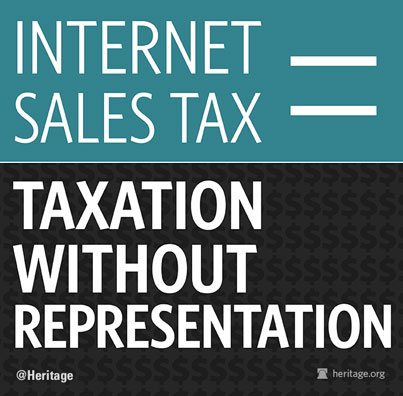Last night the Senate passed the misnamed Marketplace Fairness Act (MFA), popularly known as the Internet sales tax, by a 69–27 margin. The troubling bill will now move over to the House.
The bill would grant states the authority to force online retailers (with online sales over $1 million per year) to collect sales taxes for states in which they have no physical presence. President Obama has said he would sign the bill if it passes Congress.
Right now, states can force only businesses that have a physical presence in their state — a store, warehouse, or plant — to collect their sales taxes. This long-existing standard originated from the Supreme Court’s ruling in the 1992 Quill case. This standard was sensible then as it is now.
If you buy something online from a business that has a physical presence in your state, that business will collect sales tax from you. In fact, since the biggest online retailers—such as Walmart, Target, and even Amazon—already have a physical presence in most states, you likely already pay sales tax on a good portion of your online purchases. However, if you buy from a smaller online retailer that doesn’t have a presence in your state, it cannot be forced to collect sales tax from you.
The MFA would require online retailers to collect sales tax regardless of their physical presence. This would impose a tremendous burden on small online retailers.
For instance, it would allow Maryland to tell a small online business in Virginia that sells Virginia hams and peanuts that it has to collect Maryland’s sales tax on sales it makes to customers living in Maryland, even though the Virginia business has no attachment to Maryland other than a few customers.
Abandoning the physical presence standard would be an egregious violation of basic principles of federalism, because it would allow states to expand their power to tax and to regulate beyond their borders. The stakeholders of those businesses—the owners and employees—would have had no part in the political process that formed the state sales tax they would now have to comply with. And they would have no access to the ongoing political process in those states to address any problems they have with the laws.
Supporters of the MFA say the bill is about “fairness” because it would equalize the tax treatment between identical products purchased at brick-and-mortar stores and online stores. While taxes shouldn’t give an advantage to one type of shopping over another, in this case, the cure is worse than the disease.
The MFA is anything but fair, because instead of leveling the playing field, it would tilt it decidedly against online retailers, particularly small ones. Brick-and-mortar stores would still have to collect sales taxes only where they are physically present. Online retailers would have to collect sales taxes from the nearly 10,000 sales tax jurisdictions around the country where their customers live. That is not an equal burden.
The big online retailers can handle this burden because they have large corporate accounting departments. Small online retailers like the business that just wants to sell Virginia ham and peanuts to hungry customers around the country would be smothered by the cost of complying with so many sales taxes. Not to mention that they would be subject to time-consuming and expensive audits from 46 sales tax states, the District of Columbia, U.S. territories and possessions, Puerto Rico, and Native American tribes.
Now that the bill has passed the Senate, it will be referred to the House Judiciary Committee. That alone is a welcome development, as too much recent legislation has bypassed the important committee process. The Judiciary Committee should devote further thought to these troubling implications of the MFA.
Source material can be found at this site.










